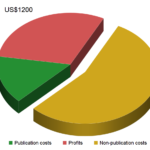Wikipedia defines ‘embezzlement‘ as “the act of withholding assets for the purpose of conversion of such assets”. Google defines it as “misappropriation of funds placed in one’s trust”:

If one takes the position that researchers at public institutions are entrusted with public funds to spend on research in the public interest, then researchers spending public funds on something that mainly benefits them personally rather than the public, may be considered in dangerous territory. The point here cannot be to make a legal case. This exercise is more of an attempt to analyze if current or future researcher publication practice can be ethically condoned, broadly speaking.
So let’s look at the current publication practice of researchers. Due to the traditional reward structure, researchers aim to publish in the most prestigious journals, in order to benefit from that prestige in tenure, hiring and promotion decisions. In subscription times, in which we still partially live, this practice does not come with immediate changes in the cost/pricing structure. However, this picture changes dramatically when Open Access publications are considered, where the journals demand payment of an article processing charge (APC). It has been documented exhaustively over several studies that these APCs scale with journal prestige. This situations provides incentives for authors to choose the most expensive publication option and there are two studies that have found such effects already:
authors choose to publish in more expensive journals
Published this year and from 2019:
higher APCs were actually associated with increased article volumes
One argument used in favor of publications in prestigious journals is article ‘quality’: research in prestigious journals is often considered of higher quality. However, that notion is not supported by the evidence which suggests that prestigious journals struggle to reach even average reliability. This leaves current author practice mainly benefiting the personal careers of researchers at the expense of the public purse.
Taken together, in a future world where every published article is financed by APCs, all else remaining equal, there will be strong incentives for authors to spend more public funds in order to benefit their own careers. Inasmuch as the excess public funds spent on prestigious journals support the spread and attention to unreliable science, this additional damage caused by this practice likely exceeds the pecuniary damage.
Legal scholars will have to weigh in on whether spending public funds exclusively for career purposes in the way described would actually constitute embezzlement in the legal sense. However, even if that bar is not met, incentives to maximize the expenditure of public funds are never advisable. There are already too many such incentives in research (e.g., overhead, grant funds in hiring, tenure, promotion, etc.). It does not seem wise to add yet another. Eventually, the scholarly community is accountable to the public. Accumulating incentives for wasting the public funds the scholarly community has been entrusted with, does not seem like an advisable strategy.














Comments are closed.